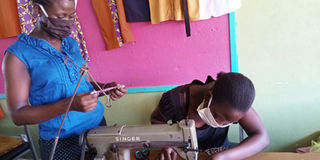Covid-19: Rescued street girls make reusable face masks for Kenyans

Diana Wambui, 18, and Eunice Kadzo, 23, making masks at a workshop at Wema Rescue Centre in Kisauni, Mombasa County, as part of efforts to help stop spread of coronavirus. PHOTO | SIAGO CECE | NATION MEDIA GROUP
What you need to know:
- With cases of the virus increasing every day, the government has made it mandatory for every Kenyan to wear a mask especially in public places, in order to slow the spread of the disease.
- Eunice Kadzo (23), Mercy Kadzo (18), Diana Wambui (18) and Faith Mukulu (19) decided to use their clothe-making skills to make reusable face masks from cotton and polyester.
Before the coronavirus outbreak, face masks were only found in hospital theatres and dusty places.
But with cases of the virus increasing every day, the government has made it mandatory for every Kenyan to wear a mask especially in public places, in order to slow the spread of the disease.
With an entrepreneurial mind, four girls given a second chance after life on the streets, came together to make one of the most demanded commodities in Kenya.
Eunice Kadzo (23), Mercy Kadzo (18), Diana Wambui (18) and Faith Mukulu (19) decided to use their clothe-making skills to make reusable face masks from cotton and polyester.
The four, who studied until Standard Eight, are looking forward to selling the products to a market in dire need, especially in Mombasa where they are based.
MULTI-SKILLED
Behind their hard work are painful stories from their past.
“I was only two years old when I was rescued from the streets,” says Diana, who has since been a resident of the Wema Rescue Centre for street children and vulnerable orphans, which is located in Bamburi, Kisauni Sub-county.
She enrolled at the school’s early childhood development centre and later joined Kiembeni Primary School, where she did her Kenya Certificate of Primary Education (KCPE) examinations.
“I did not do so well. So, I enrolled at a technical college within the centre to learn skills that would help me in the future,” she says.
Among the skills she acquired were tailoring, computer studies and food production.
“ I loved tailoring more. I watched our mentors and started practising until I perfected the skill,” she says.
For over a week now, Diana and the rest of the girls have been making masks after receiving orders from customers within and outside Mombasa.
They wake up early enough to ensure work begins at 9am and and close for the day at 5pm but this depends on the work load.
BIG DREAM
Faith was 11 years when she was taken to the centre from “Mahali Pa Usalama”, a rescue centre in Mombasa run by nuns.
She also immediately enrolled at Kiembeni Primary School.
The inability to join secondary school also saw her sign up for vocational training at the centre.
She says she enjoyed tailoring more and would like to start her own business once she finishes the one-year training.
“ The skills have helped me. I plan to use them to start my tailoring shop as a source of income."

Faith Mukulu,18, is pictured making masks at a workshop at Wema Rescue Centre in Kisauni, Mombasa County, as part of efforts to help stop spread of the deadly coronavirus. PHOTO | SIAGO CECE | NATION MEDIA GROUP
THE PROCESS
Faith says it is not so difficult for her to make the masks.
“We measure the materials, make splits, overlock them and then do the finishing before placing the elastic strings on each side,” she says, noting they make at least 100 masks a day.
She encourages people to use face masks to minimise their chances of contracting the virus.
Faith hopes well-wishers purchase the masks in bulk for distribution to street children.
“They may not get the water and soap, but having these reusable masks will help protect their health and save them from contacting the virus,” she says.
REFUGE
Eunice and Mercy are siblings who were also unable to join secondary school.
With their home almost 20km away, they stay at the centre.
Eunice says she joined the centre after seeing an advertisement that said vocational training was on offer.
“I had stayed home for many years after clearing primary school. I wanted something that would change my life; that’s why I applied to join the centre. I’m glad they took me in,” she says.
She is now on attachment at Wema after a one-year course on tailoring, food production and computer studies.
MONEY MATTERS
The masks cost Sh100 each, a price that Project Coordinator Eunice Wanja says is affordable considering they are reusable.
Just like other organisations, most of Wema's income generating activities have been grounded due to the pandemic.
“ This is an alternative way for us to raise funds for running the centre. Most of the girls are now here and have to eat and have other basic needs," the 29-year-old says.
Since advertising their products on social media, Ms Wanja says they have received orders from organisations including the children's homes they have partnered with.
“It was a suggestion by our director. With the rising need for masks and assistance from these girls, we know this will help us,” she says.
Ms Wanja hopes the centre can work with the county and national governments to protect Kenyans' lives.



